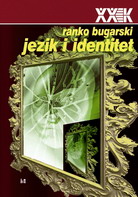 Bugarski, Ranko – Language and Identity
Bugarski, Ranko – Language and Identity
2010, pp. 280
Price 700 RSD ($10)
About the Author
Ranko Bugarski, a professor at the Faculty of Philology of the University of Belgrade, has published a large number of works in the fields of English studies, general and applied linguistics, and socio-linguistics. The 20th Century Library has published the following books by this distinguished scholar: Linguistics about Man (Lingvistika o čoveku 1975, 1983), Language and Society (Jezik u društvu, 1986), Language from Peace to War (Jezik od mira do rata, 1995), Facets of Language – socio linguistic topics (Lica jezika – sociolingvističke teme, 2001, 2002), New facets of Language – sociolinguistic topics (Nova lica jezika – sociolinguističke teme, 2002, 2009). Slang – a linguistic study (Žargon – lingvistička studija. 2003. 2007). Language and Culture (Jezik i kultura, 2005), and Europe in Language (Evropa u jeziku, 2009). Čigoja štampa (Čigoja Printing) and The 20t Centurz Library have jointly published professor Bugarski’s Collected Works in 12 volumes (Belgrade, 1996’97). He has taught at many foreign universities. He served as vice-president of The International Association of Applied Linguistics and as president of The European Linguistic Society (Societas Linguistica Europaea). He is a member of the European Academy of Sciences and Arts (Salzburg) and an expert advisor to the Council of Europe on matters of regional and minority languages. Two sets of collected papers – one international and one by his own students – were published in his honor: History and Perspectives of Language Study – papers in honor of Ranko Bugarski, Amsterdam/Philadelphia: John Benjamin, 2000; Language, society, cognition – to Professor Ranko Bugarski from his Students, Belgrade, The Faculty of Philology, 2003 (Jezik, društvo, saznanje – Profesoru Ranku Bugarskom od njegovih studenata, Beograd: Filološki fakultet, 2003).
About the book:
Language and Identity consists of essays entitled ”Language and Identity”, ”Ours and Alien in Language”, ”Protecting Minority Languages and Applied Linguistics”, ”An outline of a Professional Autobiography”, ”An Experiment in writing a Linguistic Memoir”, ”A few more Slang and Amalgamated Expressions”, and ”Selected Bibliography of Sociolinguistics for 2009 – 2010”.
Introductory Remarks:
This book was written during the 15 months following the the publication of the author’s previous book, in March of 2009. Even though it stands as an idependent whole, it was written in the same vein as the authors books preceding this one in this series:
Facets of Language – sociolinguistic topics (2001, 2002)
New Facets of Language – new sociolinguistic topics (2002, 2009)
Language and culture (2005)
Europe in Language (2009)
Content wise, this book brings up exclusively new material that arose in the above mentioned period.
The general topic of the book, woven into its text in several ways, explicitely and, at times, only implicitely, is the concept of identity, so popular and often abused these days, which the book attempts to elucidate, especially in relation to language; thus the title of the book. The book is divided into four parts. The first of them, predominantly theoretical, consists of three chapters, which originated from papers read at various scholarly gatherings that took place between August of 2008 and December of 2009, all accounted for in the bibliography at the end of the volume. The second consists of two autobiographic and memorialist texts, complementing each other, written especially for this book; their reading can be quite independent from any general topic, but in the context of this publication, and as a very extensive illustration, by the author’s peronal example, of certain points of view regarding idetity, which were only cursorily touched upon in the first part.
The author hopes that these essays – personal confessions of sorts, yet containing a broad variety of factual information on the development of linguistic science in our country and in the world during the last fifty years, as well as on the work of a large number of influential linguists, in the light of the authors personal experience – will attract attention, not only of professional linguists, but also of readers less focussed on problems of language and linguistic.
The two remaining parts represent a continuation of a tradition established in the above mentioned previous books, that of accounting for the latest slang and amalgamated expressions, as well as for the new contributions to sociolinguistic bibliography, in Serbia, printed in the book in installments (for 2009 with addenda for earlier years).



